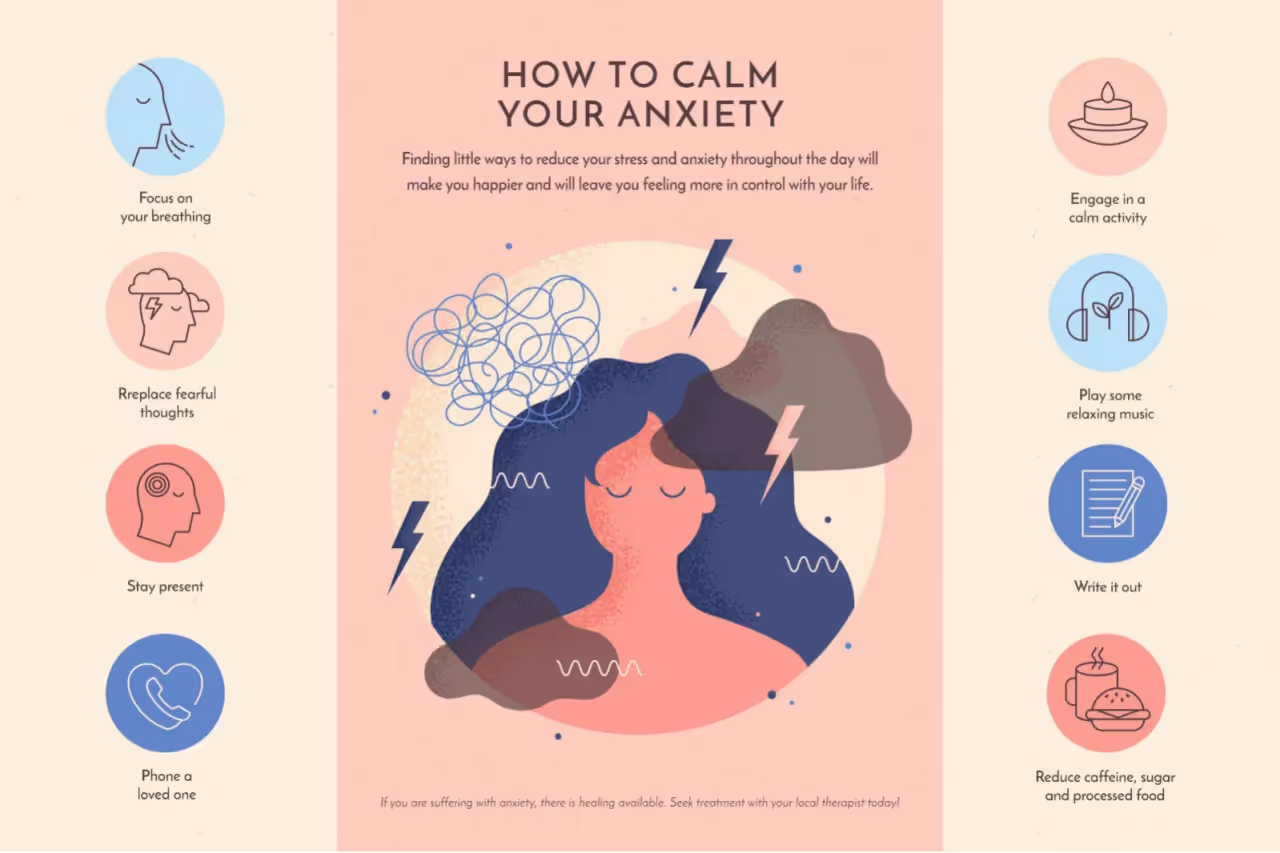Imagine that a few of your close friends are super excited about your favorite band playing in town.You've wanted nothing more than to see them live for...

Imagine that a few of your close friends are super excited about your favorite band playing in town.
You've wanted nothing more than to see them live for years, and now you have the chance!
But, then you start to think of the crowd.
Your palms start to sweat, your muscles tense up, your breathing becomes faster and shallow, and a feeling of dread takes over you.
Just the thought of being in the crowd is enough to induce a panic attack.
There's no way you could go to the concert, if the mere thought of it gives you anxiety then the actual concert would be much worse.
Right?
Anxiety robs us of some of the greatest experiences of life.
This might be an extreme example, but for many people, it's their daily life.
For many others, it may not be a full-blown panic attack, but it is intense anxiety that they must choose to suffer through or miss out on experiences altogether.
But, what if I told you there was a way to conquer anxiety?
To become resilient against anxiety?
It isn't easy and it isn't comfortable, but in the end, you can overcome your anxieties.
If you want to become resilient against anxiety then you have to be willing and courageous.
But how do you become more resilient against anxiety?
The good news is there are a lot of methods to increase your resiliency, but it isn't fun or easy.
So you have to ask yourself if you want to continue living in anxiety, or if you're ready to take control over your life.
Resiliency training is also called Stress Inoculation Training, which is the practice of decreasing the impact of stress.
And make no mistake, anxiety is stress.
Through these types of training, you can learn how to regulate your nervous system during times of stress and anxiety.
You learn how to willingly choose stress and anxiety in the short term in order to develop skills to conquer anxiety in the long term.
The biggest difference between stress that negatively impacts us and stress that helps us grow is our choice to be in stress.
By choosing stress through resiliency training, you are opting for growth and increasing your capacity for discomfort.
Throughout the process, you also build your capacity to handle stress by increasing what is called your Stress Threshold.
So, if you're ready to take your life back, let's look at how.
One of the most important things to know about stress is that your mind does not distinguish between physical stress and mental stress.
This means you can practice being resilient against anxiety by choosing to be in physical stress.
It will simultaneously improve your resiliency to mental stress.
The first way to do this is through cold exposure.
Something as simple as a 2-minute cold shower every day can make drastic improvements in your ability to handle stress and reduce anxiety.
Let's now take a look at how to start implementing cold showers and what to do in order to calm yourself down.
At the end of your regular shower turn the water as cold as it will go; it is extremely uncomfortable and shocks the body.
Turn your attention as quickly as you can to your breathing.
Focus on taking deep breaths with long exhales.
This will calm your nervous system while your body is under high stress.
This is the entire point, setting your mind while your body is reacting to stress.
This teaches your mind that stress (anxiety) isn't dangerous, it's only uncomfortable.
Doing this routinely will raise your stress threshold and decrease the impact of anxiety.
Plus, taking cold showers for a total of 11 minutes per week has been proven to increase weight loss and boost dopamine for hours after the shower.

Yes, we have come back to exercising once again.
The simple fact is that a huge part of having a healthy mind is having a healthy body, the best way to do that is to become resilient against anxiety
But, for the purpose of today and reducing anxiety, we're going to focus on exercises that get your body into stress.
If you're working out with a good intensity then your body is going to be in a state of stress.
Whether you're weight lifting, going for a run, sprinting, or anything else, you are putting your body under stress.
You are mimicking what your body does when you feel anxious, the difference is you've chosen to do this.
My personal recommendation for being resilient against anxiety is to sprint.
This is the quickest way to get your body into a high state of stress and then practice calming down.
The aim is to rapidly increase your heart rate and then focus your attention on calming down.
Like the cold shower, you can become resilient against anxiety by focusing your attention on your breathing while your body is stressed.
Sprint as fast as you can for 40 yards, then pay attention to how your body responds.
Feel your heart pounding, your muscles tensing, your body sweating, and your quick shallow breathing (just like the panic attack described above).
Now slow your breathing by taking long exhales out of the mouth and deeply inhaling through your nose.
Becoming resilient against anxiety is uncomfortable to work.
But it's necessary to conquer anxiety.
If you want to be resilient against anxiety, you have to choose to put yourself in anxiety-evoking situations and then choose the focus on calming yourself down.
You can become resilient against anxiety by increasing your mind and body's capacity for enduring stress.
Daily cold showers and regular exercise are the two best ways to put your body into a state of stress and practice calming your mind down.
Take long deep breaths to slow your heart rate.
Notice the physical discomfort and examine it like a scientist studying stress.
You don't have to be controlled by your anxiety, you just have to be willing to be uncomfortable.
To reduce your anxiety, you can practice relaxation techniques such as deep breathing, progressive muscle relaxation, guided imagery, and mindfulness practices. Additionally, regular exercise has been found to be beneficial in managing stress and improving mental health.
Ignoring anxiety can exacerbate symptoms and make it more challenging to manage over time. This can result in a negative impact on your personal, professional, and social life, leading to feelings of isolation and even depression.
Yes, Medicaid provides insurance coverage for therapy services specifically designed to help individuals struggling with anxiety, depression, and other mental health conditions.
Other activities which have been found helpful in reducing both immediate feelings of anxiousness and long-term anxieties associated with chronic disorders include yoga, journaling, nature walks, art therapy, volunteering, and other low-stress activities. Additionally, developing a healthy lifestyle incorporating adequate sleep, physical activity, and nutritious meals can help reduce overall stress levels.
Addressing anxiety is crucial because it can significantly impact your quality of life and overall well-being. Left untreated, anxiety can lead to more severe mental health issues, relationship problems, and difficulty functioning in daily life.
It's important that you feel comfortable discussing personal matters with your therapist in order to open up and get more out of therapy sessions; therefore finding someone who meets certain criteria like experience level, expertise areas, and personality is key when selecting a therapist who can give meaningful feedback about how best handle issues related to anxiety or other mental health concerns.